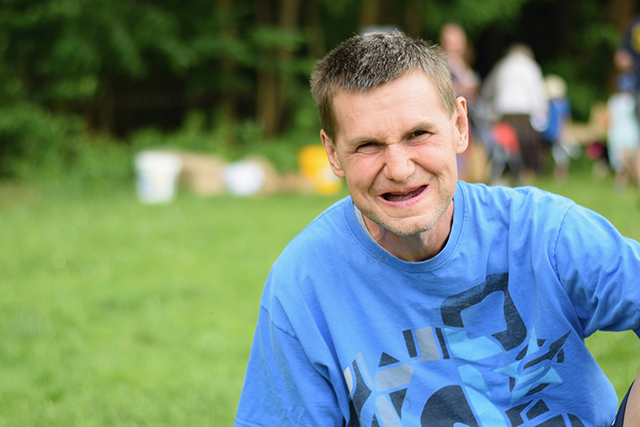What We Offer
We know you want the best care for your loved ones. GHCMHS offers services that will suit the specific care needed. Click the symbol to see brief info about that service. If you have any questions and want more detailed information about the services, feel free to contact us.

Life Skills Development
Level 1 – Companion
Companion services consist of non-medical care, supervision, and socialization activities provided to recipients age 21 years or older. The service provides access to community-based activities that cannot be provided by natural or other unpaid supports.
Level 2 - Supported Employment
Supported Employment services provide training and assistance to help support recipients in job development and sustaining paid employment at or above minimum wage unless the recipient is operating a small business. This service can be performed on a full or part-time basis and at a level of benefits paid by the employer for the same or similar work performed by trained non-disabled recipients.
Level 3 – Adult Day Training
Adult Day Training (ADT) are training services intended to support the participation of recipients in valued routines of the community, including volunteering, job exploration, accessing community resources, and self-advocacy, in settings that are age and culturally appropriate.

Personal Supports
Personal Supports
Personal Supports services provide assistance and training to the recipient in activities of daily living, such as eating, bathing, dressing, personal hygiene, and preparation of meals.
Respite Care
Respite Care is generally used due to a brief planned or emergency absence, or when the primary caregiver is available, but temporarily physically unable to care for or supervise the recipient for a brief period of time.

Residential Services
Residential Habilitation (Standard)
The standard Residential Habilitation service provides supervision and specific training activities that assist the recipient to acquire, maintain, or improve skills related to activities of daily living.
Residential Habilitation (Behavior Focused)
Behavior Focused (BF) residential habilitation service must be approved for a recipient only when it has been determined through use of the APD approved instrument by the APD regional behavior analyst or designee, and through the support planning process, that a recipient requires residential habilitation services with a behavioral focus.
Residential Habilitation (Intensive Behavior)
Intensive behavior (IB) residential habilitation is for recipients who present issues with behavior that are exceptional in intensity, duration, and frequency, whose needs cannot be met in a behavior focus or standard residential habilitation setting, and who meet one or more of the following conditions.
Specialized Medical Home Care
Services provided to recipients with complex medical conditions requiring an intensive level of nursing care residing in a foster or group home.
Supported Living Coaching
These services can include assistance with locating appropriate housing; the acquisition, retention, or improvement of skills related to activities of daily living (e.g., personal hygiene and grooming); household chores; meal preparation; shopping; personal finances; and the social and adaptive skills necessary to enable recipients to reside on their own.

Support Coordination
Support Coordination (Limited)
Limited support coordination services are services that are intended to be less intense than full support coordination.
Support Coordination (Full)
Full support coordination provides significant support to a recipient to ensure the recipient’s health, safety, and well-being.
Support Coordination (Enhanced)
Enhanced support coordination services consist of activities that assist the recipient in transitioning from a nursing facility or an ICF/IID to the community, or for assisting recipients who need a more intensive level of support coordination.

Wellness and Therapeutic Supports
Behavior Analysis Services
Behavior Analysis Services are provided to assist recipients to learn new, or increase existing, functionally equivalent replacement skills directly related to existing challenging behaviors.
Behavior Assistant Services
The primary purpose of Behavior Assistant Services (BAS) is to provide support in implementing the BASP created by the behavior analysis services provider.
Private Duty Nursing
Private Duty Nursing services are prescribed by a physician, ARNP, or PA and consist of individual, continuous nursing care provided by registered or licensed practical nurses.
Residential Nursing
Residential Nursing services are services prescribed by a physician, ARNP, or PA and consist of individual, continuous nursing care provided by registered or licensed practical nurses.
Skilled Nursing
Skilled Nursing is a service prescribed by a physician, ARNP, or PA and consists of part-time or intermittent nursing care visits, provided on a daily basis by registered or licensed practical nurses.
Physical Therapy
Physical Therapy is a service prescribed by a physician, ARNP, or PA that is necessary to produce specific functional outcomes in ambulation, muscle control, and postural development and to prevent or reduce further physical disability.
Respiratory Therapy
Respiratory Therapy is a service prescribed by a physician, ARNP, or PA and relates to impairment of respiratory function and other deficiencies of the recipient’s cardiopulmonary system.
Speech Therapy
Speech Therapy is a service prescribed by a physician, ARNP, or PA and is necessary to produce specific functional outcomes in the communication skills of a recipient with a speech, hearing, language disability, or service necessary to remediate swallowing disorders and oral motor functions.
Specialized Mental Health Counseling
Specialized Mental Health services focus on the unique treatment of psychiatric disorders and rehabilitation for impairments for recipients with developmental disabilities and mental illness and restoration to the best possible functional level.

Transportation
Transportation
This service provides transportation to and from the recipient’s home and community-based waiver services, enabling the recipient to receive the supports and services identified in both the support plan and approved cost plan, when such services cannot be accessed through natural (i.e., unpaid supports).
Have questions? Contact us! Get in Touch
All right reserved.

